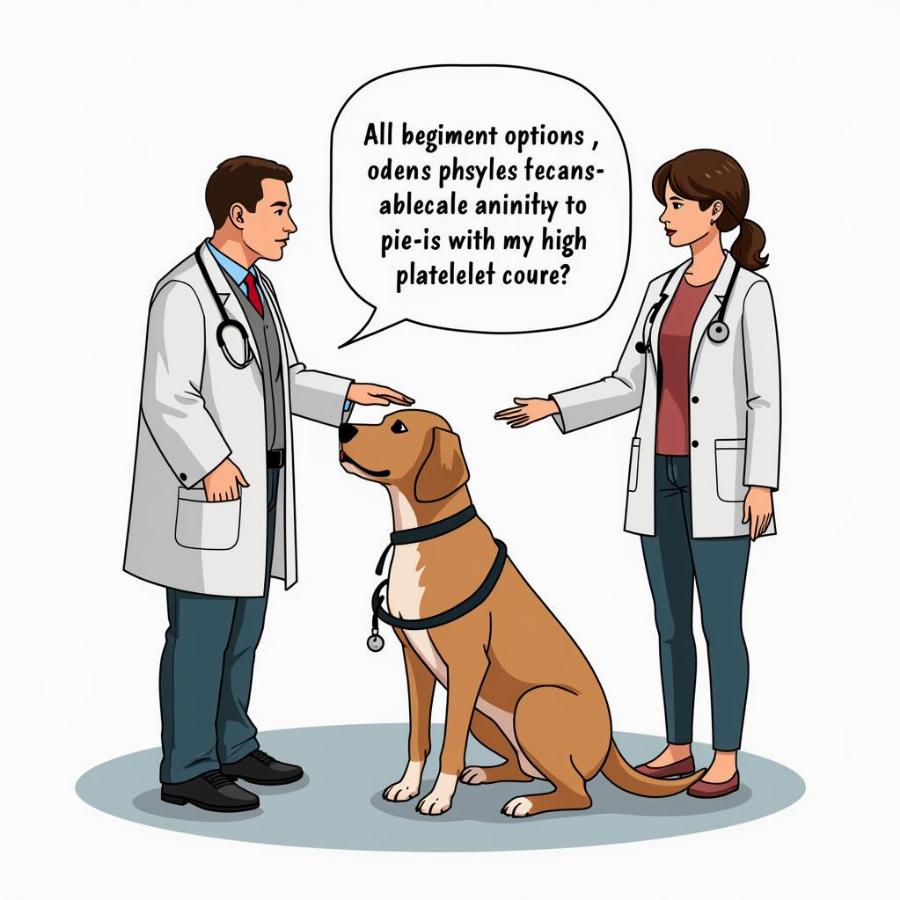High platelet count in dogs, also known as thrombocytosis, can be a sign of underlying health issues. While not a disease in itself, it’s crucial to understand its causes, symptoms, and potential implications for your furry friend. This article will delve into the details of thrombocytosis in dogs, helping you navigate this complex condition and ensure your dog receives the best possible care.
What Does a High Platelet Count in Dogs Mean?
Platelets are essential components of your dog’s blood, playing a vital role in clotting. A high platelet count can indicate a reactive thrombocytosis, often triggered by inflammation, infection, or trauma. Less commonly, it could point to a primary thrombocytosis, a bone marrow disorder. Understanding the difference is key to proper diagnosis and treatment.
Recognizing the Symptoms of High Platelet Count
Unfortunately, thrombocytosis in dogs often presents no noticeable symptoms. This makes regular veterinary checkups, including blood panel for dogs, crucial for early detection. Sometimes, symptoms related to the underlying cause, such as lethargy, loss of appetite, or bleeding disorders, might be observed.
Diagnosing Thrombocytosis in Dogs
Diagnosing high platelet count requires a dogs platelet count through a complete blood count (CBC). Your veterinarian will analyze the platelets in a dog blood smear to determine if the count is elevated beyond the normal range of platelets in dogs. Further tests may be necessary to identify the underlying cause.
What Causes High Platelet Count in Dogs?
Several factors can contribute to thrombocytosis. Common causes include:
- Inflammation: Conditions like pancreatitis or immune-mediated diseases can trigger increased platelet production.
- Infection: Bacterial, viral, or parasitic infections can elevate platelet counts.
- Trauma: Injuries or surgery can stimulate the body to produce more platelets.
- Iron deficiency: Low iron levels can sometimes lead to a reactive thrombocytosis.
- Certain Medications: Some medications can impact platelet production.
- Cancer: Though less common, certain cancers can cause an increase in platelet count.
Treatment Options for Thrombocytosis
Treating thrombocytosis focuses on addressing the underlying cause. If the high platelet count is reactive, managing the primary condition usually resolves the thrombocytosis. For example, if an infection is present, antibiotics will likely be prescribed. In cases of primary thrombocytosis, medications like clopidogrel for dogs may be considered to help prevent blood clots.
 Treating High Platelet Count
Treating High Platelet Count
When Should I Be Concerned About My Dog’s Platelet Count?
Any significant deviation from the normal platelet range warrants veterinary attention. If your dog exhibits unusual symptoms like lethargy, unexplained bruising, or prolonged bleeding, consult your veterinarian immediately.
What are the Long-Term Effects of High Platelet Count in Dogs?
Untreated thrombocytosis, particularly in cases of primary thrombocytosis, can lead to serious complications such as blood clots, which can obstruct blood vessels and cause organ damage.
Dr. Emily Carter, a veterinary hematologist, emphasizes, “Early diagnosis and treatment of the underlying cause are crucial for managing thrombocytosis and preventing potential complications. Regular blood work is key to catching these issues before they become serious.”
Conclusion
High platelet count in dogs is a complex issue that requires careful attention. Understanding the potential causes, symptoms, and treatment options is crucial for ensuring your dog’s well-being. By staying informed and proactive, you can help your furry friend lead a healthy and happy life. Don’t hesitate to contact your veterinarian if you have any concerns about your dog’s health, including potential thrombocytosis.
FAQs about High Platelet Count in Dogs
-
Q: Can stress cause high platelet count in dogs? A: While stress can cause mild fluctuations in blood parameters, it’s unlikely to be the sole cause of significant thrombocytosis.
-
Q: Is high platelet count painful for dogs? A: Thrombocytosis itself doesn’t typically cause pain, but the underlying condition might.
-
Q: How often should I check my dog’s platelet count? A: Your veterinarian will recommend the appropriate frequency of blood tests based on your dog’s age, breed, and overall health.
-
Q: Can diet affect platelet count in dogs? A: A balanced diet is essential for overall health, but it’s unlikely to directly cause or resolve thrombocytosis.
-
Q: What is the prognosis for dogs with high platelet count? A: The prognosis depends largely on the underlying cause. With proper diagnosis and treatment, many dogs with thrombocytosis can live long and healthy lives.
Beaut Dogs is your trusted resource for all things related to dog care. We provide comprehensive information and guidance on various aspects of dog ownership, from breed selection to health management. Beaut Dogs is dedicated to helping you provide the best possible care for your beloved companion. When you need support, please contact Email: [email protected] for detailed and accurate answers from Beaut Dogs.